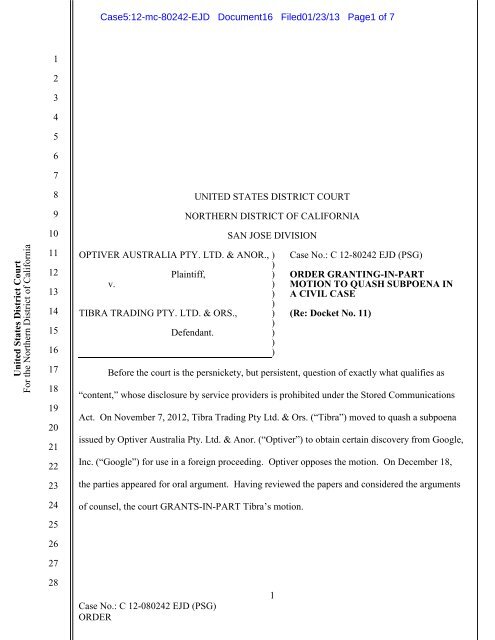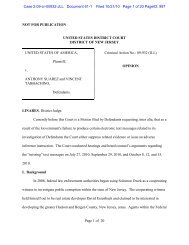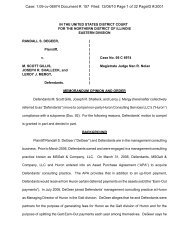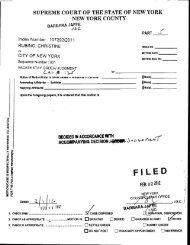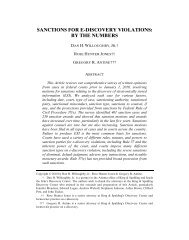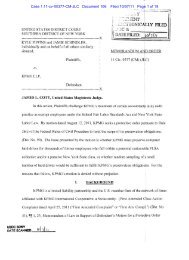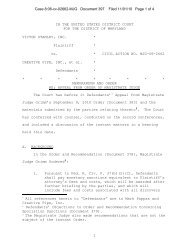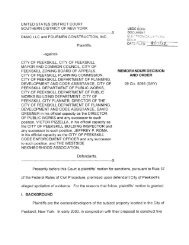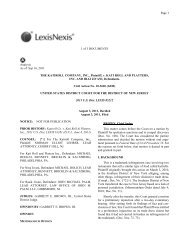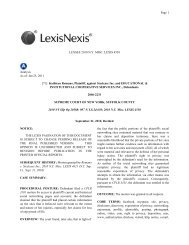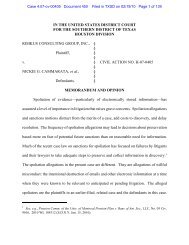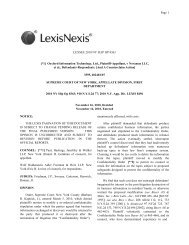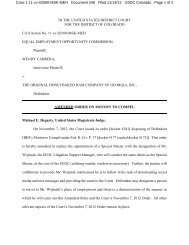Optiver Australia Pty. Ltd. & Anor. v. Tibra Trading Pty. Ltd. & Ors.
Optiver Australia Pty. Ltd. & Anor. v. Tibra Trading Pty. Ltd. & Ors.
Optiver Australia Pty. Ltd. & Anor. v. Tibra Trading Pty. Ltd. & Ors.
- No tags were found...
Create successful ePaper yourself
Turn your PDF publications into a flip-book with our unique Google optimized e-Paper software.
United States District CourtFor the Northern District of CaliforniaCase5:12-mc-80242-EJD Document16 Filed01/23/13 Page1 of 7123456789101112131415161718192021222324252627OPTIVER AUSTRALIA PTY. LTD. & ANOR.,v.UNITED STATES DISTRICT COURTNORTHERN DISTRICT OF CALIFORNIAPlaintiff,TIBRA TRADING PTY. LTD. & ORS.,Defendant.SAN JOSE DIVISION)))))))))))Case No.: C 12-80242 EJD (PSG)ORDER GRANTING-IN-PARTMOTION TO QUASH SUBPOENA INA CIVIL CASE(Re: Docket No. 11)Before the court is the persnickety, but persistent, question of exactly what qualifies as“content,” whose disclosure by service providers is prohibited under the Stored CommunicationsAct. On November 7, 2012, <strong>Tibra</strong> <strong>Trading</strong> <strong>Pty</strong> <strong>Ltd</strong>. & <strong>Ors</strong>. (“<strong>Tibra</strong>”) moved to quash a subpoenaissued by <strong>Optiver</strong> <strong>Australia</strong> <strong>Pty</strong>. <strong>Ltd</strong>. & <strong>Anor</strong>. (“<strong>Optiver</strong>”) to obtain certain discovery from Google,Inc. (“Google”) for use in a foreign proceeding. <strong>Optiver</strong> opposes the motion. On December 18,the parties appeared for oral argument. Having reviewed the papers and considered the argumentsof counsel, the court GRANTS-IN-PART <strong>Tibra</strong>’s motion.28Case No.: C 12-080242 EJD (PSG)ORDER1
United States District CourtFor the Northern District of CaliforniaCase5:12-mc-80242-EJD Document16 Filed01/23/13 Page2 of 71234567891011I. BACKGROUND 1<strong>Optiver</strong> is a trading firm. In the underlying proceeding in the Federal Court of <strong>Australia</strong>,<strong>Optiver</strong> alleges that several of its former employees copied <strong>Optiver</strong>’s proprietary source code, left<strong>Optiver</strong>, and used the code to found <strong>Tibra</strong> in 2006. In the <strong>Australia</strong>n proceeding, <strong>Optiver</strong> soughtdiscovery from <strong>Tibra</strong> of emails sent and received by individual parties related to the <strong>Optiver</strong> sourcecode. <strong>Tibra</strong> produced a number of emails, but <strong>Optiver</strong> suspected that key emails relating to theallegedly stolen code were previously deleted. In response, the Federal Court of <strong>Australia</strong> ruled<strong>Tibra</strong>’s responses were inadequate and ordered further discovery. The court’s order specificallycontemplated <strong>Optiver</strong> seeking leave of a United States court to allow <strong>Optiver</strong> to obtain discoveryfrom Google. 212131415161718192021222324252627On October, 9, 2012, <strong>Optiver</strong> filed ex parte for judicial assistance pursuant to 28 U.S.C. §1782 to serve a subpoena upon Google for documents to be used in the foreign proceeding. 3 Thecourt granted <strong>Optiver</strong>’s ex parte application. 4Soon thereafter, <strong>Optiver</strong> issued a subpoena toGoogle regarding a number of electronic communications sent or received by certain Gmailaccounts allegedly used by employees of <strong>Tibra</strong>. <strong>Optiver</strong>’s requests consist of two requests: 5Request One: Documents sufficient to identify the recipient(s), sender, subject, date sent,date received, date read, and date deleted of emails, email attachments, or Google Talk messagesthat contain either of the terms “PGP” or “<strong>Optiver</strong>” (case insensitive) sent or received between1 Unless otherwise noted, the factual background undisputed and is taken from <strong>Optiver</strong>’s“Memorandum in Support of Motion for Judicial Assistance Pursuant to 28 U.S.C. Section 1782.”See Docket No. 2, 3.2 The court understands that discovery from Google under the authority of the <strong>Australia</strong>n Courtwas unavailing. See Docket No. 3 8.3 See Docket No. 1.4 See Docket No. 6.285 See Docket No. 5, 11-12.Case No.: C 12-080242 EJD (PSG)ORDER2
United States District CourtFor the Northern District of CaliforniaCase5:12-mc-80242-EJD Document16 Filed01/23/13 Page3 of 71234567891011January 1, 2006 and December 31, 2007 for the following email addresses: (email addressesomitted).Request Two: Documents sufficient to show the recipient(s), sender, subject, date sent,date received, date read, and date deleted of emails, email attachments, or Google Talk messagessent or received between November 3, 2005 to December 31, 2009 that were sent to or from theabove-listed email addresses and to or from the following email addresses: (email addressesomitted).<strong>Tibra</strong> now moves to quash the subpoena.II. LEGAL STANDARDBy now it is well-established that civil subpoenas, including those issued pursuant to 2812131415161718U.S.C. § 1782, are subject to the prohibitions of the Stored Communications Act (“SCA”). 6Congress passed the SCA in 1986 because “the advent of the Internet presented a host of potentialprivacy breaches that the Fourth Amendment does not address.” 7The SCA prohibits service providers from knowingly disclosing the contents of a user’selectronic communications. 8 The SCA states that “a person or entity providing an electroniccommunication service to the public shall not knowingly divulge to any person or entity the192021contents of a communication while in electronic storage by that service.” 9The “contents” of a222324252627286 See Theofel v. Farey-Jones, 359 F.3d 1066, 1071-72, 1077 (9th Cir. 2004) (holding that the SCAapplies in the civil subpoena context); Suzlon Energy <strong>Ltd</strong>. v. Microsoft Corp., 671 F.3d 726, 718(9th Cir. 2011) (holding that the SCA applies to a subpoena issued under 28 U.S.C. § 1782).7 Quon v. Arch Wireless Operating Co., Inc., 529 F.3d 892, 900 (9th Cir.2008) (rev’ed in part onother grounds) (citing Orin S. Kerr, A User's Guide to the Stored Communications Act, and aLegislator's Guide to Amending It, 72 Geo. Wash. L.Rev. 1208, 1209–13 (2004)).8 See 18 U.S.C. § 2701, et seq.9 Id. subsection (a)(1).Case No.: C 12-080242 EJD (PSG)ORDER3
United States District CourtFor the Northern District of CaliforniaCase5:12-mc-80242-EJD Document16 Filed01/23/13 Page4 of 712“wire, oral, or electronic communication” is defined as “any information concerning the substance,purport, or meaning of that communication.” 103III.DISCUSSION4567891011A. Request One Impermissible Seeks Content by Requesting CommunicationsContaining the Terms “PGP” or “<strong>Optiver</strong>” in the Substance of theCommunication<strong>Optiver</strong>’s Request One seeks information pertaining to emails, email attachments andGoogle Talk messages containing the terms “PGP” or “<strong>Optiver</strong>.” <strong>Tibra</strong> argues that by requestingemails and such containing these terms, <strong>Optiver</strong> is requesting content of the communications inviolation of the SCA. <strong>Optiver</strong> responds that “PGP” is the name of an encryption system, notcontent. <strong>Optiver</strong> also argues it wants documents mentioning “<strong>Optiver</strong>” not to discover the1213141516171819202122substance of the communications, but to locate communications that might be relevant to theforeign litigation. <strong>Optiver</strong> notes that if the email has been encrypted through PGP, it cannot accessthe content without the proper encryption key and pass phrase, which it does not have.<strong>Optiver</strong> misses the point. The SCA prohibits any knowing disclosure by service providersof the content of electronic communications, no matter how insignificant. The search proposed by<strong>Optiver</strong> would necessarily reveal that the emails identified contain the terms “PGP” or “<strong>Optiver</strong>,”which are words contained in the body of the communications. These terms constitute content, orinformation concerning the “substance, purport, or meaning” of the communications. Howevertrivial, this is exactly the sort of information the SCA sought to protect. 1123242526272810 See 18 U.S.C. § 2711(1); 18 U.S.C. § 2510(8).11 Cf. Crispin v. Christian Audigier, Inc., 717 F. Supp. 2d 965, 969 (C.D. Cal 2010) (quashingsubpoena that sought all communications referring to certain keywords).Case No.: C 12-080242 EJD (PSG)ORDER4
United States District CourtFor the Northern District of CaliforniaCase5:12-mc-80242-EJD Document16 Filed01/23/13 Page5 of 71234567891011121314B. Requests One and Two Seek the Subject Lines of the Emails, Which are Contentunder the SCA<strong>Tibra</strong> next contends that both Requests One and Two violate the SCA because they seek thesubject lines of the email communications and Google Talk messages.It is clear from the purpose and nature of the subject line that it is “content” intended to fallunder the protection of the SCA. The subject lines of emails and other electronic communicationsserve to convey a substantive message about the body of the email. In the sense that theycommunicate information concerning the “substance, purport, or meaning” of the topic of theemail, subject lines are no different from the body of the email. In contrast to, say, subscriberinformation, 12 revealing the subject line would necessarily reveal information about the substanceof the communication. 13the message’s content.In fact, a message’s subject line is nothing less than a pithy summary ofMaterials from the U.S. Department of Justice and the legislative history of the SCA15161718underscore the notion that subject lines are content. The U.S. Department of Justice manualadvises United States Attorneys that subject lines are considered “content” under the SCA. 14 Thelegislative history of the SCA shows that Congress appreciated that subject lines would be included1920212223242526272812 See Mintz v. Mark Bartelstein & Associates, Inc., Case No. 12-02554 SVW SSX, 2012 WL3553351 (C.D. Cal. Aug. 14, 2012).13 Cf. In re United States for an Order Authorizing the Use of a Pen Register & Trap, 396 F. Supp.2d 45, 48 (D. Mass. 2005) (holding that “the information contained in the ‘subject’ would revealthe contents of the communication and would not be properly disclosed pursuant to a pen registeror trap and trace device”). While this case considered the Wiretap Act and not the SCA, the SCAexplicitly adopted the definition of the “content” set forth in the Wiretap Act. See 18 U.S.C. §2711(1).14 See U.S. Dep't of Justice, Searching and Seizing Computers and Obtaining Evidence in CriminalInvestigations, 123, 148 at n.15 (2001). See also Kerr, supra, at 1228 (noting “[i]t is also fairlyclear that the subject line of the e-mail counts as ‘contents,’ as the subject line generally carries asubstantive message.”)Case No.: C 12-080242 EJD (PSG)ORDER5
United States District CourtFor the Northern District of CaliforniaCase5:12-mc-80242-EJD Document16 Filed01/23/13 Page6 of 712345678910within the meaning of “content”: the House Report on the USA PATRIOT Act and the PATRIOTAct amendments state that email subject lines are “clearly content.” 15C. <strong>Optiver</strong> is Entitled to Non-Content MetadataIn the event the court finds that the requests seek impermissible content, <strong>Optiver</strong> asks thatthe court only quash the portion that violates the SCA. The court struggles to understand how suchinformation would be helpful to <strong>Optiver</strong>, who states its goal in requesting this information is to“seek[] data regarding these email accounts to potentially support its arguments in the FederalCourt of <strong>Australia</strong> that <strong>Tibra</strong> has intentionally destroyed evidence that indicates it stole <strong>Optiver</strong>’ssource code.” 16 But <strong>Optiver</strong> is entitled to such non-content metadata, and such metadata it shall11receive. 17 IV. CONCLUSION1213141516171819The SCA offers broad protection against disclosure of content by service providers.<strong>Optiver</strong>’s Request One is invalid because it seeks disclosure of the terms “<strong>Optiver</strong>” and “PGP,” so<strong>Tibra</strong>’s motion to quash Request One is GRANTED. Request Two violates the SCA insofar as itseeks the subject of the communications, but the remainder is permissible. Accordingly, consistentwith the remainder of the subpoena, Google is required to provide only the following information:“Documents sufficient to show the recipient(s), sender, date sent, date received, date read, and date20212223242526272815 H.R. Rep. No. 107-236, Part 1, at p. 53 (2001) (“Thus, for example, an order under the [SCA]could not authorize the collection of email subject lines, which are clearly content”).<strong>Tibra</strong> further argues Requests One and Two impermissibly seek the file names of emailattachments, which it argues are content under the SCA. In its response, however, <strong>Optiver</strong>explicitly disclaims any interest in the attachments, mooting the argument. See Docket No. 13 at 6.16 Docket No. 13 at 3.17 See Beluga Shipping GMBH & Co. KS BELUGA FANTASTIC v. Suzlon Energy LTD., Case No.10-80034 JW PVT, 2010 WL 3749279 (N.D. Cal. Sept. 23, 2010) (holding that Google, as aservice provider, was only required to produce non-content information such as names of the emailaccount holders, when the email accounts were created, and the countries from which the emailaccounts were created).Case No.: C 12-080242 EJD (PSG)ORDER6
United States District CourtFor the Northern District of CaliforniaCase5:12-mc-80242-EJD Document16 Filed01/23/13 Page7 of 7123deleted of emails, email attachments, or Google Talk messages sent or received between November3, 2005 to December 31, 2009 that were sent to or from” the email addresses listed.IT IS SO ORDERED.4567891011Dated: January 23, 2013_________________________________PAUL S. GREWALUnited States Magistrate Judge1213141516171819202122232425262728Case No.: C 12-080242 EJD (PSG)ORDER7


